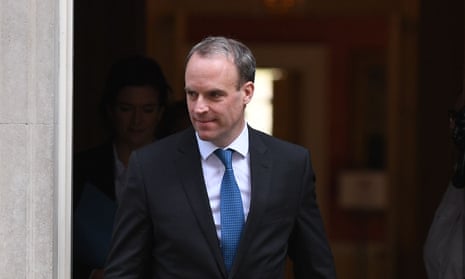Ministers and their advisers do not yet have a plan for how to leave the UK’s coronavirus lockdown, according to multiple government sources, despite the chief medical officer saying the country is “probably reaching the peak” of the epidemic.
With signs that the rate of new infections is flattening, the government is under pressure to outline some ideas about how the UK could leave its state of shutdown. The Labour leader, Keir Starmer, has demanded the publication of an “exit strategy”.
Dominic Raab, the foreign secretary, will set out plans on Thursday for an extension of the lockdown potentially for another three weeks, after a Cobra meeting involving the leaders of Scotland, Wales and Northern Ireland.
However, senior Whitehall sources said the absence of Boris Johnson from No 10 had delayed the coordination of a central exit strategy and described how different cabinet ministers were working out their own theories from within their departments.
These include allowing certain business sectors to emerge first, prioritising reopening schools, letting younger people have more freedom than older people or relying on antibody tests to relax restrictions for those who may have developed immunity to Covid-19.
Ministers are under orders to avoid talking about exiting the lockdown but Nadine Dorries, a health minister, hinted on Wednesday night that it would be a long process, tweeting: “There is only one way we can ‘exit’ full lockdown and that is when we have a vaccine. Until then, we need to find ways we can adapt society and strike a balance between the health of the nation and our economy.”
Journalists should stop asking about an ‘exit strategy.’ There is only one way we can ‘exit’ full lockdown and that is when we have a vaccine. Until then, we need to find ways we can adapt society and strike a balance between the health of the nation and our economy . #COVID19
— Nadine Dorries 🇬🇧 (@NadineDorries) April 15, 2020
One government source with knowledge of the situation said there was no secret plan and the necessary conversations had not yet even happened at the right level, adding: “People are looking at the evidence but there is nothing central and cross-government that has been produced. It’s lots of shadow-boxing at the moment.”
Another source familiar with No 10’s thinking said there was no blueprint, while a third Westminster source said Sir Mark Sedwill, the cabinet secretary, had been pushing for Johnson to return before a plan was agreed, the hope in Downing Street being that the prime minister may be able to return to some degree of work next week.
The UK’s approach contrasts with that of many other European countries, including Denmark, France, Germany and Switzerland, which have announced how they will come out of lockdown. Italy, Spain and Austria have already reopened some shops or sent workers back into specific factories.
The UK government’s experts have said it is “too early” to talk about leaving lockdown, when it is not clear that the spread of coronavirus has slowed. But Prof Chris Whitty, the chief medical officer for England, said on Wednesday that the UK was “‘probably reaching the peak overall” with things flattening out even though the death toll may rise “for a short while”.
However, he added: “At the moment we are not yet at the point where we can say confidently and safely this is now past the peak.”
Prof Dame Angela McLean, the deputy chief scientific adviser, said experts expected the spread to slow evenly throughout the country, suggesting there will not be a geographical difference in when people are allowed to leave the lockdown.
With signs of the curve flattening, health experts said it was essential for the government to start preparing better for leaving the lockdown with the help of public health academics.
Dr Bharat Pankhania, a senior clinical lecturer at the University of Exeter medical school, with field experience in the Sars and Ebola epidemics, said the government needed to commit to testing and contact tracing, then start hiring and training contact tracers at scale.
“Keep the shutdown until we know we can cope with patients. Use the opportunity to scale up manufacture of PPE and ventilators. When you feel you have amassed your PPE, test kits, the army needed to do the tests and army of contact testers, that is when you lift the shutdown. But you only do that when you know the test numbers are in a sustained downward trajectory,” he said.
“In an emergency you can recruit many people and get them to help you under supervision. We did this during the swine flu pandemic. We are not doing that now. There is no indication we are preparing for that now.”
Pankhania expressed scepticism that contact tracing voluntarily through an app would be good enough, adding: “You miss out all the grannies, uncles, older parents who are not tech savvy but are in high risk groups.”
He also called for the membership of the government’s scientific advisory group for emergencies (Sage) to be made public, so that he and fellow experts could see the range of experience and disciplines being relied on to advice on the pandemic. The government has so far refused to release the list of its key advisers for security reasons.
A former chief scientific adviser, Prof Sir David King, also criticised the government’s response and called on it to “massively step up measures”, including mass testing, which the current chief scientific advisers and medical advisers had suggested until recent days was not practical.
“Until we get testing done on a very much wider scale, we’re not going to begin to manage this,” he told LBC radio.
King, who was adviser from 2000 to 2007, said it appeared that there was a plateau in new infections but that the failure to record deaths outside hospitals meant “we really haven’t a clue where we are” and comparisons with other countries were “beginning to look really awful”.
